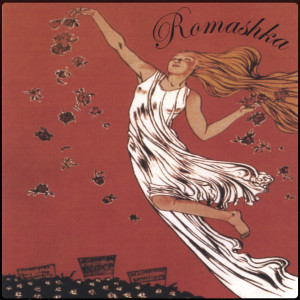 In a little over a year, Romashka have built a reputation as one of the most exciting and energetic bands in New York City’s world music scene. Before converging on Brooklyn, the band’s eight members cut their musical teeth in different locations, including a number of Ivy League institutions. Lithuanian-born singer Inna Barmash co-founded the Princeton-based outfit the Klez Dispensers, wind player Jeff Perlman spent four years with the Yale Klezmer Band, and guitarist Joey Weisenberg served as musical director of the Columbia Klezmer Band. Tuba player Ron Caswell, trumpeter Ben Holmes, accordionist Steven Iancu, percussionist Timothy Quigley, and fiddler Jake Shulman-Ment have likewise built up impressive musical resums with backgrounds in Gypsy, klezmer and Balkan musical traditions, with hints of jazz and rock thrown in as well.
In a little over a year, Romashka have built a reputation as one of the most exciting and energetic bands in New York City’s world music scene. Before converging on Brooklyn, the band’s eight members cut their musical teeth in different locations, including a number of Ivy League institutions. Lithuanian-born singer Inna Barmash co-founded the Princeton-based outfit the Klez Dispensers, wind player Jeff Perlman spent four years with the Yale Klezmer Band, and guitarist Joey Weisenberg served as musical director of the Columbia Klezmer Band. Tuba player Ron Caswell, trumpeter Ben Holmes, accordionist Steven Iancu, percussionist Timothy Quigley, and fiddler Jake Shulman-Ment have likewise built up impressive musical resums with backgrounds in Gypsy, klezmer and Balkan musical traditions, with hints of jazz and rock thrown in as well.
The diversity of backgrounds and emotions that comprise Romashka’s music are reflected in the band’s name; “Roma” is what we call Gypsies call themselves, “Mashke” is Yiddish for “liquor,” and “Romashka” is the Russian word for “daisy.”
Romashka formed in late 2003 with the primary purpose of celebrating the musical traditions of the Roma. In their live performances, and now with their self-titled debut album, they explore the depths of these traditions by combining superior musicianship with relentless energy and a Brooklyn attitude. Produced by Perlman, the new CD adds some subtlety and depth to Romashka’s live sound, although at the expense of a little of the band’s on-stage energy. Given that, Romashka ably represents a fresh young band at the beginning of what will hopefully be a long and productive career.
Romashka consists of four songs and four instrumentals, opening with the peppy minor-key dance instrumental “Mariana,” a Romanian Gypsy standard. Romashka performs this piece primarily in a Balkan brass band style, but Perlman and Holmes also trade some jazzy improvisations, and Shulman-Ment adds a fiddle flourish near the end. Barmash then leads the band through the soulful Russian Gypsy tango, “Loli Phabay (The Red Apple),” with a very distinctive “hop, hop, hop” in the chorus. Quigley’s castanets add a touch of subtlety to this recording that would escape notice in Romashka’s live performances. “Shimdiggy,” composed by Perlman, differs a bit from the traditional pieces on the disc in that the tonic chord is major instead of minor, but maintains the same high energy level as the other tunes. Like the previous song, the recording of “Shimdiggy” includes a few background effects that require the listener to pay attention. Barmash then sings in Russian on “Tayna (A Secret),” another sad tango. The instrumental accompaniment is dominated here by Iancu’s chords on the accordion and some fine picking on the guitar by Weisenberg.
“La Crcuma De La Drum (The Tavern On The Road),” a Romanian Gypsy song, is the most energetic of the four songs on this disc. Barmash’s vocals are overshadowed somewhat here by the frenzied bass line played by Caswell on the tuba. The band mixes genres and influences on the short instrumental “Rustemul,” with Weisenberg playing a bluesy riff on guitar while the horns and fiddle play the melody for a traditional Romanian folk dance. The band next performs a medley of “Zaznobila & Baro Faro (She Messed With My Head In The Great City),” a pair of Russian oompah Roma songs. As is common for Roma songs, this piece starts out slowly but then steadily gets much faster. The bouncy instrumental “Moldovan Batuta,” a traditional Moldovan tune frequently performed by klezmer bands, completes the disc officially. However, Romashka includes as a bonus track a scaled-down remix of “Tayna,” minus the drums and altered to sound like a grainy old vinyl recording.
Having seen Romashka perform on several occasions, I could discern a slight difference in the approach the band took to making this disc relative to their concert performances. The album focuses more on the musical details, and less on the feverish intensity that characterizes a Romashka concert. For the most part, Romashka reveals the strong collective musicianship of the band, particularly the rhythm section, to a degree that the more frenetic live shows cannot match. I would make an exception, though, for Jake Shulman-Ment, whose fiddling compares well to that of the Hungarian fiddlers of Muzsikás; the disc would have benefited from more of his solo playing. Inna Barmash holds her end of the bargain as well, effortlessly singing in several languages with a maturity that belies her age. Excepting a few high notes on “Zaznobila & Baro Faro” that sound a bit beyond her comfortable range, Barmash’s vocals magnify Romashka’s emotional power and remain solid throughout the disc. One could debate whether Romashka’s performance in the recording studio matches what they regularly do on stage, but the band has much to recommend them either live or on disc. Romashka will command the attention of any listener interested in Roma, Balkan, and klezmer music, along with anybody simply looking for something high octane to help them party the night away.
(Romashka, 2005)
